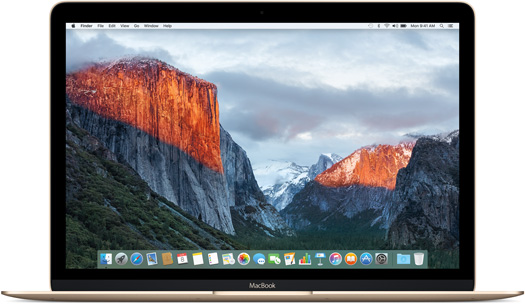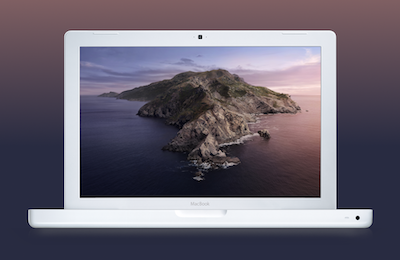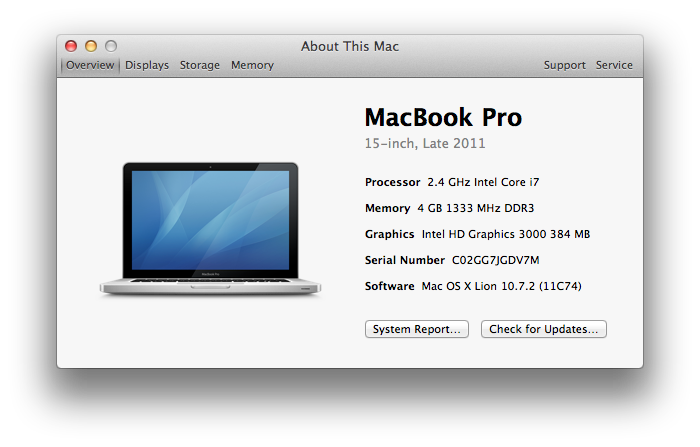The Intel-based iMac is a series of Macintosh desktop computers designed, manufactured and sold by Apple Inc. It is a member of the iMac family. It is one of four desktop computers in the current Macintosh lineup, serving as an all-in-one alternative to the Mac Mini, and sits below the performance range iMac Pro and Mac Pro. Tech Specs: MacBook Pro (17-inch, Late 2011) MacBook Pro (15-inch, Late 2011) Model Identifier: MacBookPro8,2 Part Numbers: MD322xx/A, MD318xx/A Newest compatible operating system: macOS High Sierra 10.13.6 Tech Specs: MacBook Pro (15-inch, Late 2011) User Guide: MacBook Pro (15-inch, Late 2011) MacBook Pro (13-inch, Late 2011). The 'Late 2011' MacBook Pro models are so similar to the 'Early 2011' models that Apple didn't bother to release an updated instruction manual. For the 'Mid-2012' MacBook Pro line, Apple's 'Quickstart' Guide does not cover RAM installation, but the procedure is the same as earlier models.
- Latest Os For Macbook Pro Late 2011 Update
- Macbook Pro Late 2011 Review
- Latest Os For Macbook Pro Late 2011
- Best Os For Macbook Pro Late 2011
- Latest Os For Macbook Pro (13-inch Late 2011)
Mac OS X Lion (version 10.7) is the eighth major release of macOS, Apple's desktop and server operating system for Macintosh computers. A preview of Mac OS X 10.7 Lion was publicly shown at the 'Back to the Mac' Apple Special Event on October 20, 2010. My previous MacBook was the 2011 model and it still works today, but after 10 years it became too slow and the trackpad had trouble clicking, so after a TON of research, I decided to pull the trigger and get the New MacBook Pro with the M1 chip.
Unibody MacBook Pro Q&A
Update Published May 10, 2016
All Mac Q&As >>Unibody MacBook Pro Q&A | Also See: All MacBook Pro Specs
To be notified of new Q&As, sign up for EveryMac.com's bimonthly email list.
If you find this page useful, please Bookmark & Share it. Thank you.

How do you upgrade the RAM in the 'Mid-2009' through 'Mid-2012' MacBook Pro models? What type of RAM do they use? How much RAM does each model actually support?
Please note that this Q&A is up-to-date and covers pre-Retina 'Unibody' MacBook Pro models. EveryMac.com also provides details about RAM options for the subsequently introduced Retina Display MacBook Pro line.
The RAM upgrade procedure for the 'Mid-2009,' 'Mid-2010,' 'Early 2011,' 'Late 2011' and non-Retina Display 'Mid-2012' MacBook Pro models is fairly easy. It's not quite as easy as it is for earlier 'pre-Unibody' MacBook Pro systems, as these later models require a screwdriver, but it still is simple and straightforward.
Photo Credit: Apple, Inc. ('Unibody' MacBook Pro Models)
Identification Help
If you're not sure which MacBook Pro you have, these models can be identified by the Model Identifier 'closely enough' to an exact match for the purpose of upgrading the RAM. In turn, each model can be uniquely identified via model identifier and one or more secondary identifiers (like processor speed and/or processor type).
EveryMac.com's Ultimate Mac Lookup feature -- as well as the EveryMac app -- also can uniquely identify these models by the Serial Number, which is listed on the bottom of the notebook in small type toward the hinge, as well as within the operating system alongside the model identifier. More details about specific identifiers are provided in EveryMac.com's extensive Mac Identification section.
To locate the model identifier in software, select 'About This Mac' under the Apple Menu on your computer and click the 'More Info...' button. If the MacBook Pro is running OS X 10.7 'Lion' or later, you will need to click the 'System Report' button after clicking 'More Info...' as well. EveryMac.com has carefully hand documented each model identifier for your convenience.
The model identifiers for each of these models follow:
MacBook Pro | Subfamily | Model Identifier |
Mid-2009 | ||
Mid-2009 | ||
Mid-2009 | ||
Mid-2009 | ||
Mid-2009 | ||
Mid-2009 | ||
Mid-2009 | ||
Mid-2009 | ||
Mid-2010 | ||
Mid-2010 | ||
Mid-2010 | ||
Mid-2010 | ||
Mid-2010 | ||
Mid-2010 | ||
Mid-2010 | ||
Mid-2010 | ||
Mid-2010 | ||
Early 2011 | ||
Early 2011 | ||
Early 2011 | ||
Early 2011 | ||
Early 2011 | ||
Early 2011 | ||
Early 2011 | ||
Late 2011 | ||
Late 2011 | ||
Late 2011 | ||
Late 2011 | ||
Late 2011 | ||
Late 2011 | ||
Late 2011 | ||
Mid-2012 | ||
Mid-2012 | ||
Mid-2012 | ||
Mid-2012 | ||
Mid-2012 |
RAM Types & Actual Maximum RAM Capacities
All of these systems have two memory slots that are accessible by removing the bottom case, but the type of RAM as well as the actual maximum capacity varies for different models. Apple formally recommends that you 'fill both memory slots and install an identical memory module in each slot' for all of these systems.
The 'Mid-2009' and 'Mid-2010' MacBook Pro models support 1066 MHz PC3-8500 DDR3 SO-DIMMs and officially and unofficially support a maximum of 8 GB of RAM with one odd exception.
Specifically, as discovered by OWC, the 13-Inch 'Mid-2010' MacBook Pro models (and only the 13-Inch models) -- the MacBook Pro 'Core 2 Duo' 2.4 13' Mid-2010 and 'Core 2 Duo' 2.66 13' Mid-2010 identified by MacBookPro7,1 -- can support up to 16 GB of RAM with dual 8 GB memory modules if they are running OS X 10.7.5 or higher, have been updated to use the latest EFI, and are equipped with proper specification memory modules. If running a version of Mac OS X 10.6 'Snow Leopard,' these models only can use 8 GB of RAM.
The 'Early 2011' and 'Late 2011' MacBook Pro models use faster 1333 MHz PC3-10600 DDR3 SO-DIMMs. They officially support 8 GB of RAM, but OWC has determined that they actually support 16 GB of RAM regardless of the operating system installed, although only the 'Early 2011' MacBook Pro models are capable of running a version of Mac OS X 10.6 'Snow Leopard.'
Finally, the 'Mid-2012' non-Retina Display MacBook Pro models use faster still 1600 MHz PC3-12800 DDR3 SO-DIMMs and likewise officially support 8 GB of RAM, but actually can support as much as 16 GB of RAM. These models do not run versions of OS X prior to OS X 10.7 'Lion.'

Much like the identification help, these details are easiest to visualize as a chart:
MacBook Pro | Model Identifier | SO-DIMM | Max |
1066 PC3-8500 | 8 GB | ||
1066 PC3-8500 | 8 GB | ||
1066 PC3-8500 | 8 GB | ||
1066 PC3-8500 | 8 GB | ||
1066 PC3-8500 | 8 GB | ||
1066 PC3-8500 | 8 GB | ||
1066 PC3-8500 | 8 GB | ||
1066 PC3-8500 | 8 GB | ||
1066 PC3-8500 | 16 GB† | ||
1066 PC3-8500 | 16 GB† | ||
1066 PC3-8500 | 8 GB | ||
1066 PC3-8500 | 8 GB | ||
1066 PC3-8500 | 8 GB | ||
1066 PC3-8500 | 8 GB | ||
1066 PC3-8500 | 8 GB | ||
1066 PC3-8500 | 8 GB | ||
1066 PC3-8500 | 8 GB | ||
1333 PC3-10600 | 16 GB* | ||
1333 PC3-10600 | 16 GB* | ||
1333 PC3-10600 | 16 GB* | ||
1333 PC3-10600 | 16 GB* | ||
1333 PC3-10600 | 16 GB* | ||
1333 PC3-10600 | 16 GB* | ||
1333 PC3-10600 | 16 GB* | ||
1333 PC3-10600 | 16 GB* | ||
1333 PC3-10600 | 16 GB* | ||
1333 PC3-10600 | 16 GB* | ||
1333 PC3-10600 | 16 GB* | ||
1333 PC3-10600 | 16 GB* | ||
1333 PC3-10600 | 16 GB* | ||
1333 PC3-10600 | 16 GB* | ||
1600 PC3-12800 | 16 GB* | ||
1600 PC3-12800 | 16 GB* | ||
1600 PC3-12800 | 16 GB* | ||
1600 PC3-12800 | 16 GB* | ||
1600 PC3-12800 | 16 GB* |
† Officially, these two models support 8 GB of RAM, but they actually can support 16 GB of RAM. However, this is if and only if they are running OS X 10.7.5 or higher, have been updated to use the latest EFI, and are equipped with proper specification memory modules.
* Officially, these models all support 8 GB of RAM, but they actually support 16 GB when running any compatible version of (Mac) OS X.
RAM Upgrade Instructions
Apple explains how to install memory starting on page 35 of the 13-Inch, 15-Inch, and 17-Inch 'Mid-2009', 13-Inch, 15-Inch, and 17-Inch 'Mid-2010,' and 13-Inch, 15-Inch and 17-Inch 'Early 2011' MacBook Pro User Guides, respectively, and this provides most of what you need to know to upgrade the pre-installed memory.
The 'Late 2011' MacBook Pro models are so similar to the 'Early 2011' models that Apple didn't bother to release an updated instruction manual. For the 'Mid-2012' MacBook Pro line, Apple's 'Quickstart' Guide does not cover RAM installation, but the procedure is the same as earlier models.
However, perhaps even better than drawings, OWC provides convenient step-by-step videos of the process for the 13-Inch, 15-Inch, and 17-Inch models alike.
13' MacBook Pro RAM Upgrade Video
Mid-2009, Mid-2010, Early 2011, Late 2011 & Non-Retina Mid-2012
15' MacBook Pro RAM Upgrade Video
Mid-2009, Mid-2010, Early 2011, Late 2011 & Non-Retina Mid-2012
17' MacBook Pro RAM Upgrade Video
Mid-2009, Mid-2010, Early 2011 & Late 2011
After watching these videos, it should be clear that upgrading the RAM is easy. However, if you do not feel comfortable -- or have the time -- to perform the upgrade yourself, hiring a professional always is a good option.
MacBook Pro RAM Purchase Options
Just because RAM meets the minimum listed criteria does not mean that it will necessarily function as intended in a particular Mac. Be sure to buy from a quality vendor that has tested their RAM with your Mac to ensure full compatibility.
In the US (and many other countries), site sponsor Other World Computing sells memory as well as storage for all MacBook Pro models for do-it-yourself upgrades.
In the UK and Ireland, site sponsor Flexx sells MacBook Pro compatible memory with free shipping. The company provides flat rate shipping to France, Germany, and Switzerland and inexpensive shipping for all of Europe, too.
In Canada, site sponsor CanadaRAM sells memory for all MacBook Pro models with guaranteed compatibility, fast shipping, and no customs.
In Germany, site sponsor CompuRAM sells quality memory for all MacBook Pro models with affordable delivery country-wide and in person pick up and professional installation service available in Munich.
Latest Os For Macbook Pro Late 2011 Update
In Australia, site sponsors Macfixit and Upgradeable sell MacBook Pro compatible memory with fast shipping, a money-back guarantee and more.
In New Zealand, site sponsor Upgradeable New Zealand sells MacBook Pro memory with fast delivery to all corners of the country, precise compatibility, a lifetime warranty, and a money-back guarantee.
Macbook Pro Late 2011 Review
Also see:
- How do you upgrade the hard drive in the 'Mid-2009' through 'Mid-2012' 13-Inch, 15-Inch, and 17-Inch MacBook Pro models? What type of hard drive do these models support? How do you replace the hard drive with an SSD?
- How do you replace the optical drive in the 'Unibody' MacBook Pro models with a hard drive or SSD? Is it possible?

Latest Os For Macbook Pro Late 2011
Permalink | E-mail a Friend | Bookmark & Share | Report an Error/Typo
Suggest a New Q&A | Sign Up for Bimonthly Site Update Notices

<< Unibody MacBook Pro Q&A (Main) | Also See: All MacBook Pro Specs
Best Os For Macbook Pro Late 2011
Latest Os For Macbook Pro (13-inch Late 2011)
EveryMac.com is provided 'as is' without warranty of any kind whatsoever. EveryMac.com, and the author thereof, shall not be held responsible or liable, under any circumstances, for any damages resulting from the use or inability to use the information within. For complete disclaimer and copyright information please read and understand the Terms of Use and the Privacy Policy before using EveryMac.com. Use of any content or images without expressed permission is not allowed, although links to any page are welcomed and appreciated.
